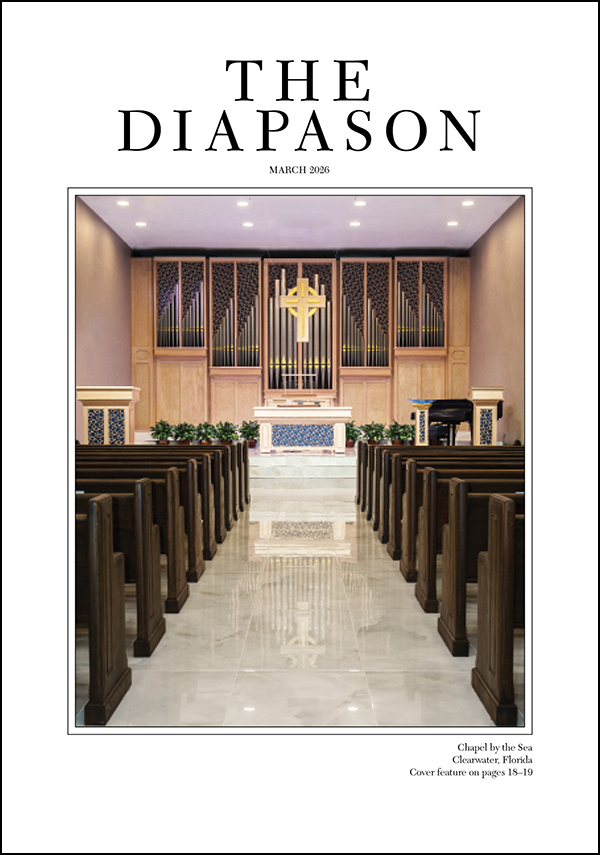
Robert Charles Shone died January 13. He was born February 16, 1927. For over three decades in the mid-20th century, he established himself as a Gregorian chant and Renaissance and Baroque music performance presenter and scholar in the Washington, D.C., metropolitan area. Assuming the position of organist and choirmaster at Ascension and St. Agnes Episcopal Church in the heart of Washington at the age of 30, he developed a select ensemble of singers whose voices suited the early music and Latin-text Masses and motets that he loved, such as those by Heinrich von Biber, André Campra, and Jean Gilles, and that were embraced by the Anglo-Catholic environment of St. Agnes.
By 1967, Shone had built over the course of two years with volunteer assistance a two-manual, 1,000-pipe organ utilizing pipework saved from the 1875 organ that was original to the church and dismantled in 1945. His intent was to build a dependable and artistically successful instrument voiced according to the concept of the Baroque sound accepted at that time. He managed to accomplish this while working a 40-plus-hour week at his father-in-law’s custom mattress business in order to support his wife and three children. Upon the organ’s completion, Shone conceived and initiated an annual Bach festival that subsequently continued for the 30 years of his tenure at St. Agnes, making the church a center of musical culture with appearances by prominent organists such as Vernon deTar and others as well as early music instrumental ensembles and choirs from the Washington-Baltimore environs.
Shone earned a Bachelor of Music degree from The Catholic University of America, a Master of Arts degree in music from Columbia University, and the Colleague certificate of the American Guild of Organists. He had been continuously involved in church music from the age of eight when he was a boy soprano chorister in Baltimore. During his high school years, Shone became an assistant organist to his teacher, Sherman Kreuzburg, at St. Stephen’s Episcopal Church, Washington, D.C. During his World War II military service, he served as a chaplain’s assistant, ultimately succeeding organist Virgil Fox at Walter Reed Army Medical Center. During this time, Shone commenced organ studies with Paul Callaway at the Washington National Cathedral. University years followed after Shone’s military obligations ended, and concurrent with his studies, he held church positions as organist and choir director at a number of churches in the Washington, D.C., and New York areas until accepting the post at St. Agnes.
In addition to the work he was accomplishing at St. Agnes, Shone’s long-standing and intense interest in Gregorian chant led to the development of a select, all-male vocal ensemble, a performance/study group that ultimately sang in Washington monasteries as well as at the National Cathedral, the Basilica of the National Shrine of the Immaculate Conception on the campus of Catholic University, and St. Matthew’s Catholic Cathedral, among other venues.
In 1989, Shone relocated to Pinellas County, Florida, and served as organist and choir director at Good Samaritan Episcopal Church, the Presbyterian Church of Palm Harbor, St. John’s Episcopal Church, St. Matthew’s Episcopal Church, and finally the Episcopal Church of the Good Shepherd, each time building a choir and developing an expansive music program. He held his final position until retirement in 2017 at the age of 90.
Throughout his career, Shone actively participated as a member of the American Guild of Organists, having served twice as dean of the Clearwater Chapter. Additionally, he was a frequent recitalist throughout the Washington metropolitan and Tampa Bay areas, performing hundreds of concerts encompassing a wide repertoire of music from all periods. Along with his wife Theresa Villani, a solo cellist, the duo offered programs of both cello/organ and cello/piano that often included notable but neglected works of merit. In 2003 the pair recorded a disc of the organ/cello repertoire entitled A Royal Dialogue at St. Matthew’s Episcopal Church in south St. Petersburg, Florida, employing the Casavant organ there.
Other recent obituaries:

